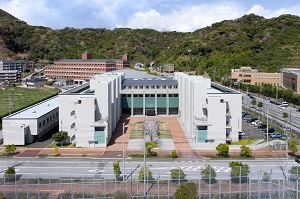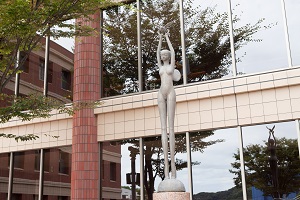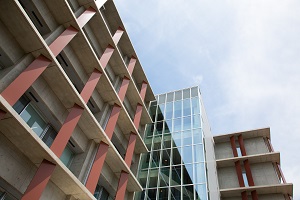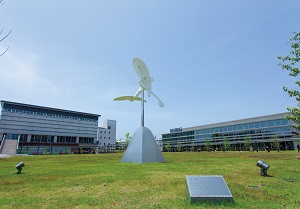本文
Educational Philosophy and Aims
Faculty of Cultural Studies
Educational Philosophy
The University of Kochi Faculty of Cultural Studies shall be established in accordance with the following philosophy in order to achieve the aims stipulated in Article 1 of the University of Kochi Bylaws.
Deepen understanding of humans and society through multifaceted cultural research in the humanities and social sciences, develop a well-rounded character and the ability to act proactively through the critical succession of culture, and contribute to the creation and improvement of local culture, while at the same time developing citizens who are able to contribute internationally to the achievement of a truly abundant and cohesive society.
Educational Aims
The University of Kochi Faculty of Cultural Studies conducts education and research to achieve the following aims in accordance with the philosophy stipulated in Article 1.
Develop the basic academic abilities that are applicable to activities in any field, through strengthening of the ability to read, write, listen, and speak, by means of sustained and systematic learning from enrollment to graduation and acquisition of the basic IT skills needed by people living in contemporary society.
2. Development of character
Proactively acquire a broad range of learning while being grounded in a personal specialty, foster the concern for the good of the community and ethical standards required of citizens who constitute society, and develop the truly well-rounded character needed to achieve a cohesive society.
3. Development of the basic skills needed as members of society
Develop the basic skills needed as members of society to proactively think and act regardless of the type of difficulty or challenge, strive to communicate with others, and push forward to solve problems.
4. Development of deep sensitivity and ability to think
Aim to deepen understanding of humans and develop deep sensitivity and the ability to think, through literary education and research that extends beyond the boundaries of peoples and nations, from ancient to contemporary times.
5. Development of advanced linguistic communication skills
Conduct education and research on language from a socio-linguistic perspective and aim to develop advanced practical communication skills through language.
6. Development of the ability to take action that contributes to the creation of local culture
Aim to develop the ability to tackle the issues of contemporary society from a cultural perspective culture and to take action that contributes to the creation of local culture.
Faculty of Nursing
Educational Philosophy
Article 1 The University of Kochi Faculty of Nursing shall be established in accordance with the following philosophy in order to achieve the aims stipulated in Article 1 of the University of Kochi Bylaws.
Develop richly creative and well-rounded individuals who are able to pioneer nursing into the future, work with people to solve health problems, and contribute to formation of healthy lifestyles, on a foundation of the nursing philosophy, as well as specialized knowledge, techniques, and humanism.
Educational Aims
Article 2 The University of Kochi Faculty of Nursing conducts education and research to achieve the following aims in accordance with the philosophy stipulated in Article 1.
1. Development of the ability to respect the lifestyles and systems of values of others while practicing nursing
Develop the ability to advocate human dignity and the unique identity of individuals, always take action with the perspective of those receiving care in mind, provide care that enables people to utilize their own abilities according to their own will, and explain such matters from an ethical standpoint.
2. Development of the ability to practice nursing in accordance with specialized knowledge/techniques and scientific/ethical judgment
Develop the ability to utilize specialized nursing knowledge and techniques in accordance with a comprehensive understanding of people and practice nursing in accordance with scientific/ethical judgment, in order to solve health problems.
3. Development of the ability to anticipate the needs of society and cooperate with a variety of occupations to solve problems
Develop the ability to identify the needs of an ever-changing society, and as a nursing care provider, partner with other healthcare personnel, etc., to proactively fulfill the role of solving health problems.
4. Development of the ability to take a professional approach to forming healthy lifestyles in the community
Cultivate an attitude of learning proactively and on one's own initiative and an identity as a nursing care provider, and develop the ability to have self-awareness as a specialist and contribute to the formation of healthier lifestyles.
5. Development of the ability to promote the interdisciplinary development of nursing from an international perspective
Develop the ability to pursue the core essence of nursing, from a broad and research-centered perspective, and contribute to the future systemization of nursing science.
Faculty of Social Welfare
Educational Philosophy
Foster the ability to put welfare principles into practice proactively to address the various problems that are faced in social living, and develop promising human resources who are able to contribute to the improvement of welfare in a broad range of areas in society, with an empathetic mind and well-rounded character, through teaching and researching specialized knowledge, practical knowledge, and practical skills related to contemporary welfare issues, supported by a deep understanding of humans and respect for human rights.
Educational Aims
(1) Development of the ability to respond to the welfare issues of families and communities
Provide an understanding of a welfare philosophy based on human rights, from the fundamental perspective of normalization. Further, in order to accommodate increasingly diverse and complex welfare needs, it is necessary to develop the ability to reform the functions that families and communities have fulfilled while supplementing each other in the past, and provide support for such efforts. The Faculty of Social Welfare aims to provide the specialized knowledge that can be used to address such problems.
(2) Development of the ability to put social welfare into practice
Develop the ability to acquire the specialized skills that make it possible to respond to the various types of welfare need and proactively provide welfare assistance supported by science.
(3) Development of social welfare specialists who aim for effective collaboration with health, medical, and welfare specialists
Develop social welfare specialists who strive for effective collaboration with health, medical, and welfare specialists, have the specialized knowledge needed to do so, and are able to provide welfare assistance, in order to address the escalating problem of a low birthrate and aging population in Kochi Prefecture.
Faculty of Nutrition
Educational Philosophy
Article 1 The University of Kochi Faculty of Nutrition shall be established in accordance with the following philosophy in order to achieve the aims stipulated in Article 1 of the University of Kochi Bylaws.
Develop individuals who understand the essential nature of people, health, and the environment, and who are able to research “food” (the source of life) and contribute in a broad range of fields in order to enable people to live healthy lives.
Educational Aims
Article 2 The University of Kochi Faculty of Nutrition conducts education and research to achieve the following aims in accordance with the philosophy stipulated in Article 1.
1. Development of the ability to understand the essential nature of people, health, and the environment
Develop the ability to understand the essential nature of the people and environments that determine human health.
2. Development of specialized knowledge/techniques and the ability to think scientifically
Develop the specialized knowledge and practical knowledge/techniques needed for the promotion of good health, recovery from injury and illness, and prevention of injury and illness, and foster the ability to think scientifically throughout.
3. Development of the ability to anticipate changes in society and cooperate with other occupations to solve problems
Develop the ability to identify the needs of an ever-changing society, and as a national registered dietitian, partner with other healthcare personnel to solve problems proactively.
4. Development of a well-rounded character
Proactively acquire a broad range of learning while being grounded in a personal specialty, foster the concern for the good of the community and ethical standards required as a member of society, and develop the truly well-rounded character needed to achieve a cohesive society.
5. Development of the ability to contribute to the community
Develop the ability to utilize the characteristics of the community in education and research to contribute to the promotion of good health, recovery from injury and illness, and prevention of injury and illness for the local community.









